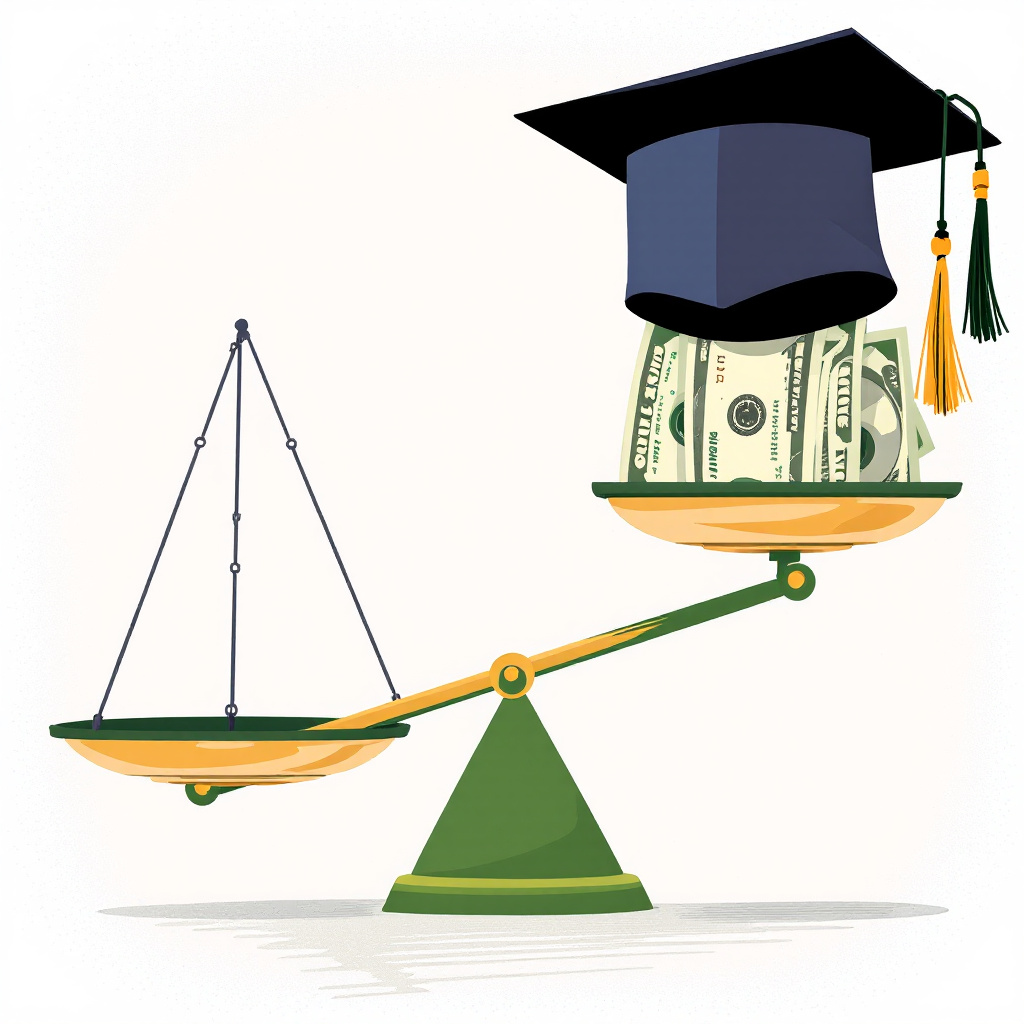The Pros and Cons of Student Loans: Navigating Secured Loans
Ah, student loans—a necessary evil for many who dare to dream big in the land of higher education. You’ve likely heard the horror stories of folks drowning in debt, paying off their student loans well into their young adulthood. But what if I told ya there’s more to this tale? Truth be told, while the road to financing your education is paved with myriad options, let’s yank open the hood and take a good look at one unsung hero in the great saga of student loans—secured loans.
What’s the Deal with Student Loans?
Before diving into the nitty-gritty of secured loans, we’ve gotta understand the lay of the land. Student loans are essentially the gold ticket to make higher education a reality for many. They’re designed to cover tuition, books, supplies, and other educational expenses. These loans are broken into two main camps:
- Federal Student Loans: Funded by Uncle Sam, these babies include options like Direct Subsidized and Unsubsidized Loans, PLUS loans, and the famous Direct Consolidation Loans. They usually offer lower interest rates and more flexible repayment plans.
- Private Student Loans: Offered by banks or credit unions, these are ideal for those who need a little extra to cover the gap left by federal loans. But heads up! They often come with higher interest rates and stricter terms.
With these options in your back pocket, many students are left grappling with the decision of which loan is best. Enter the player we’re highlighting today—secured loans. They can be a game-changer for some, and a big ol’ caution sign for others.

Secured Loans: The Ins and Outs
A secured loan requires some form of collateral—something to guarantee repayment. Think of it as the lender’s way of saying, You bring something to the table, and we’ll lower your rates. The collateral can be a car, house, or any other valuable asset. If you’re pondering using secured loans to tackle student debt, here’s the scoop:
The Perks of Secured Loans
- Lower Interest Rates: Thanks to the collateral, lenders view secured loans as less risky. This often translates to lower interest rates compared to unsecured loans, which means less money out of your pocket in the long run.
- Higher Borrowing Limits: Need more dough than what a typical student loan offers? Secured loans generally come with higher borrowing limits, making them an attractive option for those attending pricey schools.
- Improved Credit Opportunities: Consistently making payments on a secured loan can do wonders for your credit score, opening doors for future financial endeavors.
- Flexible Repayment Plans: In some cases, lenders may offer more flexible repayment options tailored to your financial situation.
The Caveats of Secured Loans
- Risk of Losing Collateral: Aye, there’s the rub, as they say. Should you default on your loan, the lender can seize your collateral. This risk makes it essential to ensure you’re confident in your ability to repay the loan in full.
- More Complex Application Process: Applying for a secured loan is no walk in the park. Because you’re putting an asset on the line, the application process can be more intricate, requiring additional documentation and time.
- Possibly Higher Fees: Depending on the lender, you might face higher upfront fees compared to unsecured loans. Always read the fine print before signing on the dotted line.
Secured Loans Compared to Other Types of Student Loans
Now that you’ve got a handle on the nuts and bolts of secured loans, how do they stack up against the usual suspects? Let’s play compare and contrast with federal and private student loans:
Federal vs. Secured Loans
- Interest Rates: Federal student loans usually boast lower, fixed interest rates compared to private loans. However, secured loans can offer comparable, sometimes even lower rates, especially if you have excellent credit and valuable collateral.
- Repayment Plans: Federal loans win in the flexibility department, offering plans like Income-Driven Repayment and Public Service Loan Forgiveness. Secured loans largely rely on individual lender policies.
- Collateral Requirements: Unlike secured loans, federal loans don’t require collateral, which might be a deal-breaker for some.
Private vs. Secured Loans
- Interest Rates & Terms: Private loans are infamous for their high-interest rates and inflexible terms. Secured loans, with their lower rates, might be more attractive if you have something to offer as collateral.
- Application Process: Both private and secured loans can be complex, especially compared to federal loan applications. It pays to keep all your ducks in a row when applying.
Who Should Consider a Secured Loan?
By now, you might be asking yourself, Is a secured loan my knight in shining armor? Well, hold your horses. This path isn’t for everyone. Here’s who might benefit the most:
- Those with Valuable Assets: If you’ve got a valuable car, home equity, or another asset, a secured loan may be a viable route to lower interest rates and higher borrowing limits.
- High Debt Situation: Maybe federal loans don’t cover all your needs, and private loans seem like robbery to you. A secured loan could bridge that gap.
- Strong Repayment Confidence: If you’re reasonably sure of your future earning potential and ability to meet monthly obligations, secured loans offer the rewards to match the risk.
- Credit-Building Opportunity Seekers: Want to boost your credit score while funding school? Stick to your repayment plan and watch your credit rise.
Playing It Safe with Secured Loans
Even if secured loans sound as appealing as Grandma’s apple pie, it’s crucial to do your homework before diving in. Here are some tips to ensure you’re making a smart financial choice:
- Review Your Finances: Before taking any loan, assess your current and future financial situation. Can you reasonably afford the payments?
- Understand the Risks: Be completely aware of what happens if you default. Losing your collateral can have dire consequences.
- Shop Around: Get multiple quotes from different lenders to ensure you’re snagging the best deal.
- Read the Fine Print: Make sense of all terms and conditions, and don’t hesitate to ask questions.
- Consult a Financial Advisor: Seek professional advice if you’re unsure. It’s always better to be safe than sorry.
So, whether you’re juggling between different student loans or fancy a secured loan for your education needs, consider all angles. Education is invaluable, and financing it wisely paves the way for a future less burdened by debt and more filled with possibilities.
Keep your eyes on the prize, dear student, and may your financial journey be as smooth as creamy butter!
FAQs
Is $200,000 in student loans a lot?
Your monthly payment is likely high if you’ve got $200,000 or more in student loans, making the idea of extra payments seem near impossible. However, paying extra might help get you out of debt significantly faster. Let’s say you have $200,000 in student loans at 6% interest on a 10-year repayment term. By making additional payments, you can reduce the payment duration and save on interest.
What are the four types of federal student loans?
Federal student loans are broken down into four categories: Direct Subsidized Loans, Direct Unsubsidized Loans, Direct PLUS Loans, and Direct Consolidation Loans. Each type has different eligibility criteria, interest rates, and repayment plans tailored to meet a variety of needs.
Is anyone paying their student loans right now?
Now that the COVID-19 payment pause has ended, student loan payments have restarted. For most borrowers, the first payment after the payment pause ended was due in October 2023. Borrowers should check with their loan servicers to get the latest updates and follow recommended payment schedules.
What happens if you default on a secured student loan?
If you default on a secured student loan, the lender has the right to seize the collateral you offered when you took out the loan. This is why it’s crucial to assess your financial situation and ensure you can make the required payments before committing to a secured loan.
Can secured loans be used for all educational expenses?
Yes, secured loans can cover a variety of educational expenses, including tuition, fees, books, supplies, and sometimes even living costs. However, the specifics will depend on the terms set by your lender. Always confirm the coverage scope before taking out the loan.

